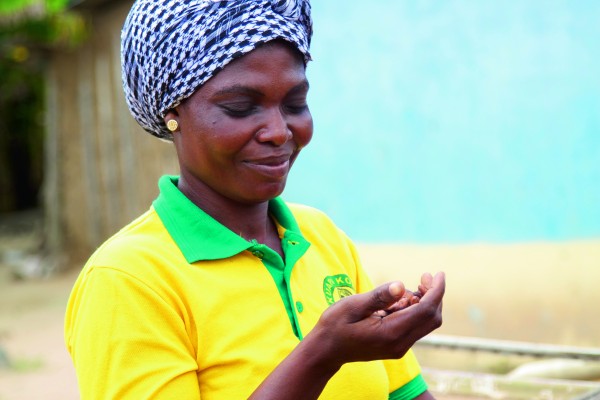A fair share

As consumers become increasingly interested in where the items they buy come from and how they are produced, the concept of Fairtrade is growing in popularity. Margaret Rooke reports:
Cocoa farmer Mercy Zaah is not at her smallholding at the Kuapa Kokoo co-operative in Ghana tending her trees in the blazing sun. Instead, she is shivering on a London street with a big smile on her face, surrounded by Fairtrade supporters she has travelled across the world to meet.
Unusually for a cocoa farmer, Zaah has just tasted the end product produced from her harvest – a bar of Divine Fairtrade chocolate. “After so many years growing cocoa pods in the heat of Ghana, I am amazed to come to the UK in the cold to see and taste the products our cocoa goes into,” she says during the trip, which has been organised to encourage increased sales and awareness of the brand. “I feel so proud that we at Kuapa help to create something this delicious – and that we own the Divine Chocolate company too.”
A fair share
Divine Chocolate is one of the best known names in Fairtrade: the company’s additional point of difference is that it is co-owned by the 85,000 strong Ghanaian farming co-operative. This special relationship means that the farmers are paid a share of Divine’s profits and have more of a say within the cocoa industry.
The lives of the cocoa farmers are explained to consumers through Divine, making the relationship between shopper and farmer stronger and clearer. The additional premium money that comes to the co-operative via Fairtrade has been spent on schools, mobile healthcare facilities and clean water, all of which inspire purchase. It has also paid for scales to weigh the cocoa; in the days before Fairtrade the farmers say they were often cheated out of money for their crops when traders used fixed scales.
A recent move to help female farmers gain the self-assurance to own farms and take on leadership roles has also been of great interest over here. And the women have an important role at Kuapa Kokoo. They often take the lead in processing the cocoa beans, which is what gives cocoa its delicious taste.
The people behind the ingredients are at the heart of Fairtrade products. This is not to say that taste, quality and branding are not important. They are vital. But a fair price for smallholder cocoa and sugar farmers, an additional premium for community projects and an organised, democratic structure are the real points of difference.
The Fairtrade symbol is a clear and simple way of showing this difference and the scheme has attracted some of the biggest names in UK confectionery.
Improving lives
Fairtrade chocolate now accounts for 16 per cent of all chocolate sales in the UK, and sugar has recently overtaken coffee and bananas in the league table of UK Fairtrade sales.
The Fairtrade Foundation reports that more and more premium money is being used by cocoa farmers to replace old cocoa trees to increase productivity and to invest in better facilities for crop collection, storage, transport and processing. In fact the producers are encouraged to re-invest 25 per cent of premium back into productivity and quality improvement activities, as better quality cocoa means higher prices regardless of Fairtrade.
Stephen Lord, product officer for cocoa, Fairtrade Foundation, says: ‘These farmers may only work a few hectares of land, but they are skilled and professional, wanting to do their very best for their families and their co-operative. Working together in this way is also an excellent way to improve quality and share information.”
Stephen adds that the average cocoa farmer is in his or her 50s and that younger generations are not attracted to farming because of the years of under payment. The cocoa industry is facing a future where there will be nowhere to grow the cocoa the market is demanding and no one to grow it. These are issues that Fairtrade is confronting head on.
The scale of the problem
The successes of Fairtrade within the UK confectionery market have been huge – it accounts for £732,000 (€901,000) of a total market worth £4.5m (€5.5m), and increases over the past few years have been impressive. Yet despite these gains, just 1.2 per cent of the cocoa in the world is sold on Fairtrade terms. Of the 50 million people who depend on cocoa for their livelihoods, only a small percentage experience the fair deal that comes with Fairtrade.
Millions of small-scale sugar cane farmers and plantation workers typically live on just a few dollars a day. Through Fairtrade, sugar farmers have increased their incomes and invested in their farms and communities, buying tractors, improving their crops and building schoolrooms. But there’s still more to do. Many of the 37,000 farmers Fairtrade works with would like to sell more on Fairtrade terms. There are always large numbers of farmers who want to join, and to allow them in the market must grow.
Responsible sourcing
Products that carry the Fairtrade symbol must contain only Fairtrade ingredients. For example, in a bar of chocolate, the sugar, cocoa and other ingredients such as nuts, raisins or spices must be Fairtrade. Anything that is produced in the developed world, such as milk or hazelnuts, cannot be Fairtrade certified and so is traded conventionally.
The Fairtrade Sourcing Program has recently been established by Fairtrade International and launched in many European markets including Germany and Switzerland to give cocoa and sugar farmers the opportunity to sell more of their crops on Fairtrade terms. It is a way for Fairtrade producers to benefit from the businesses that are making commitments to ‘responsible sourcing’ – buying key commodities fairly and sustainably as a core part of how they do business.
This means the focus is not on one final product but on a big sourcing commitment at commodity level across a whole range or a whole business. This is a different way for companies to work with Fairtrade and brings increased sales for Fairtrade farmers with more benefits for their communities. As a result of early commitments, the programme has increased the amount of cocoa sourced on Fairtrade terms by more than 20 per cent in 2014. These commitments are communicated to consumers by the Fairtrade Sourcing Program mark.
Future developments
A Fairtrade Sourcing Program for cocoa or sugar with on-pack labelling has not yet been launched in the UK. However, the Fairtrade Foundation is interested in working with companies to help them source cocoa or sugar on Fairtrade terms for corporate commitments to the Fairtrade Sourcing Program, which would not be communicated on pack.
Fairtrade provides defined premiums of US$200 (€165) per tonne above the purchase price of cocoa, which is paid directly to the farmers’ organisations that manage it for their own benefit. The farms also gain through the Fairtrade minimum pricing model and programmes and the training they receive through Fairtrade. These benefits also apply to the new sourcing programme, so there is much to be gained by farmers.
One recent convert to the scheme is Ferrero, which announced it would purchase 20,000 million tonnes of Fairtrade certified cocoa over the next three years. This commitment has been welcomed by smallholder cocoa farmers in Ivory Coast. “We have big plans to invest in renewing our aged cocoa plants, a warehouse, trucks to transport cocoa, school improvements, drinking water and more. We are working to build up the strength of our members and their communities,” says Moussa Bamba, president of Ecookim, one of the country’s Fairtrade certified co-operatives.
Nine other companies have announced that they will be joining the Fairtrade cocoa programme. This includes: Mars, which will source the cocoa for its Twix bar in Germany (and is working towards 100 per cent cocoa certification by 2020); German companies Rewe Group and Riegelein; Coop in Switzerland is aiming to source Fairtrade cocoa for all of its own-label products by 2017 in addition to its current commitments; Japanese retailer Aeon is planning to increase its volumes of Fairtrade cocoa ten-fold by 2020; and commitments have been made by Swiss biscuit firm Kambly and Lidl and Kaufland in Germany.
The current deals will benefit existing and new Fairtrade cocoa farmers in Ghana, the Ivory Coast, the Dominican Republic and Peru.
The aim of the Fairtrade Sourcing Program, which applies to cocoa, sugar and cotton, is to give businesses new ways to work with Fairtrade or to increase their commitments, focusing on one or two commodities at a time to improve the lives of the farmers who grow them. It will also provide shoppers with more ways to support Fairtrade farmers and workers.
This commodity sourcing model will mean a breakthrough year for farmers, according to Harriet Lamb, CEO of Fairtrade International. “We’re determined to drive ever greater opportunities for farmers and workers at the sharp end of the injustices in global trade,” says Lamb.
“Fairtrade Sourcing Programs are an important innovation that open up new markets for farmers. We’re delighted to have so many businesses on board – and I am sure there are more to come,” she adds.



